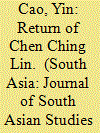| Srl | Item |
| 1 |
ID:
111235


|
|
|
|
|
| Publication |
2012.
|
| Summary/Abstract |
Russians entered Iranian military service in this period in two waves, each wave characterizing a specific period in Iranian-Russian relations. The first was subaltern in origin and came in the form of the deserters from the Russian imperial army who fled to Tabriz in the early nineteenth century and who made a significant contribution to Iranian efforts to build a modern army. The second took place in the late nineteenth-early twentieth century and consisted of representatives of the tsarist military elite, Russian Cossack officers, who came to Iran between 1879 and 1920 and formed the Iranian Cossack Brigade, and their opposites, Caucasian revolutionaries who joined the constitutional movement in order to continue their struggle against the Russian imperial regime. The article raises a series of questions, not only about the extent of Russian influence suggested by the presence of Russian soldiers, but also about its character. Why did Iran place such a high value on Russian military expertise? Who were the Russians who served in the Iranian military? How were they received in Iran? What effect did Iranian society exercise on them and to what extent did the changes transforming Russia affect the roles they played in Iran?
|
|
|
|
|
|
|
|
|
|
|
|
|
|
|
|
| 2 |
ID:
181677


|
|
|
|
|
| Summary/Abstract |
During World War II, thousands of Chinese soldiers were sent to India for training. Many of them deserted from the army and made a new life in India. Chen Ching Lin was one of these deserters. Following the course of his journey in India from 1943 to 1946, this article not only unearths the little-known experiences of the Chinese deserters in India, but also explores how the Chinese Nationalist Government’s aim to discipline the overseas Chinese communities conflicted with the agenda of British geopolitics. It further contends that modern Chinese and Indian history could be integrated into a single narrative framework from subaltern perspectives.
|
|
|
|
|
|
|
|
|
|
|
|
|
|
|
|